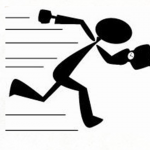How to Achieve Anything in Just One Year
Daily priorities are routine habits like waking up when your alarm goes off, going to work, and picking up things from the corner store to make dinner. Daily priorities are the goals that you can accomplish today, and often MUST be accomplished today.
Long-term goals are the more challenging goals to achieve, since they require attention but they’re often pushed aside in favor of the daily priorities. Long-term goals are things like advancing your career, paying off debt, saving for retirement, learning a foreign language, or any other goal that can’t be done in just one day.
Although you can easily lose sight of long-term goals in favor of daily priorities, long-term goals are ever-present. They loom in the back of your mind until another year passes, when you realize you’re no further along in achieving them. Once they’re on your mind, your long-term goals seem neglected, as if to say “Did you forget about me? Aren’t I what you really want to be doing?”
I recently read a book that is helping me keep my long-term goals in the forefront of my mind, so that I can make conscious efforts to work towards them on a regular basis. Put another way, I’ve learned some methods for working your long-term goals into your daily routine.
Last year, Jason Harvey sent me a copy of his book “Achieve Anything In Just One Year: Be Inspired Daily to Live Your Dreams and Accomplish Your Goals.”
Achieve Anything appealed to me because it suggested a theme of gradual progression towards accomplishment. Additionally, I have many goals that I’m determined to achieve, but I often struggle when it comes to getting organized and finding time for all of them. Harvey’s book helps with all of this and more.
The format of Achieve Anything is simple: There are 365 pages corresponding each day of the year. The intention is to invest about 5 minutes per day reading just one page. The day’s page will contain an inspiring quote, a description of where you’re likely to be on the path to your goals, and some advice for how to keep advancing towards them.
For example, Achieve Anything begins with “Day 1” where Harvey admits that he has no proof that this book will change your life. Consequently, your first assignment will be an act of faith.
The first assignment is a simple task: get a notebook. You’ll use it to document your progress towards your goals, and you’re instructed to carry it with you wherever you go. When you think of something that you want — one of “your dreams” — it is important to record that dream in your notebook, regardless of how seemingly impossible it may be.
Day 1’s assignment was a teaser, but I was intrigued enough to bite. I drove to my local Border’s and picked out a small notebook that fit in my pocket, so that I could take it wherever I went. Here is my journal entry from the first day:
I started reading a book called “How to Accomplish Anything in One Year,” but I didn’t get very far. You have to read one page a day, and each day has a homework assignment. Today’s assignment was to buy a notebook and write down my dreams in it. It’s supposed to be a journal that I take with me everywhere, so I went with this small moleskine. Let’s hope it’s large enough to hold all of my dreams.
I dream about winning the lottery. I dream about having a job that I love to do everyday. I dream about owning my own house. In this house I have my own personal arcade with pinball machines, Donkey Kong, and even a bowling lane. I dream about being a concert pianist capable of sight reading music. I dream about surfing frequently for the enjoyment. I dream about publishing my own book, and being able to earn a wonderful living off of my craft. I dream about having a muscular body. I desperately want to stay on track to getting down to 160, but still have over 15 pounds to lose. I dream about having more confidence. I dream about having enough money constantly coming in that I never need to worry about the amount that I’m spending. I dream about being happier more often. I dream about not being a peon worker on the front lines being steamrolled by angry customers every day. I dream about being able to dance like a champ, so that I can impress everyone on the dance floor with my awesome moves. I dream of never needing to answer to anybody else that’s telling me what to do or how to live my life. I dream about being a great success doing what I love.
There, I wrote down my dreams. Or at least the ones on my mind tonight.
I’m supposed to carry this with me everywhere for at least a week. It’s supposed to be an act of faith for this book I’m starting to read.
I don’t know how I feel about the book, but I know that I feel like something about my life needs to change.
I’m tired of wanting more. I want to start being the person I always hoped to be.
Looking back on it, I had a lot of initial skepticism, but found the act of writing down what was on my mind to be incredibly therapeutic. Furthermore, writing down my goals gave form to my feelings, and made them much more real.
Another day’s assignment was about self-assessment. I was tasked with writing three sentences that define me, and I felt challenged by this request since I don’t like trying to “summarize” who I am. I imagined that describing an entire human being’s purpose, existence, and self in a single paragraph was just impossible. Still, I wrote it out:
I am a guy who craves more out of life. I strive towards a life that’s completely happy and content, but I often face obstacles that make my “perfect life” seem very far away. My biggest obstacle is fear, and yet my biggest fear is a life wasted.
I’m not certain how the paragraph above will sound to anyone else, but to me it’s “Shaun Boyd in a nutshell.” When you’re given limits as to how much you can say in a self-assessment, the truly important points shine through, and the result is quite profound.
Achieve Anything has you write out many different things as the days progress, but they all involve introspection: Five things you like about yourself. Five things you’d like to change. Five things about your life that make you feel successful and proud, etc. As time goes on, you’re tasked with going back to these previous entries you’ve written and choosing more specific things that you want to delve into deeper.
One of my goals involves advancing my skills as a piano player. There was one song in particular that I wanted to learn for several years, but I was seemingly incapable of learning: “Come Sail Away” by Styx.
Before reading Achieve Anything I was trapped in a cycle: I’d watch videos of other people on Youtube playing the song I wanted to be playing. I’d feel envious of their musical abilities and believe that my own skills paled in comparison. My girlfriend always made fun of me, saying that if I spent the amount of time practicing that I spent watching others play this piece, that I’d know it by now.
The thing is, I was doing it wrong. I was constantly searching the internet for shortcuts, watching people who knew how to play this piece over and over again to see if I could simply mimic their actions to learn this single song. I would call up tutorial videos and repeatedly rewind the video while at the keyboard hoping that I could jump right in to this song that was far above my skill level. It never worked.
Achieve Anything helped me understand how I needed to deconstruct this goal in order to accomplish it. In other words, before I could learn Come Sail Away, I needed to learn how to read sheet music. Having already tried this on my own unsuccessfully, I knew that I would need help. So before I could read sheet music, I needed to find a piano teacher. I found a local instructor who helped me with my sight-reading ability, but even then I learned how deconstruction played an important role in learning a music piece:
Come Sail Away is not a song that is intended to be learned in one session. Similar to long term goals, sheet music is broken down into smaller steps. In music, these smaller sections of the piece are called “measures,” and these measures are then broken down into smaller “notes.”
I’d play individual measures over and over, and would need to break them down into two different melodies: the left-hand and the right-hand. These separate melodies were mastered individually, which required strategic finger-placement to play efficiently so that I could maintain the tempo when I was finally ready to combine hands.
The lesson here is that there are no shortcuts. If I were to have skipped all of these steps and pushed forward by mimicking the way others played the piece and memorizing their finger positions, I’d have only been hurting myself in the long run. Although I might have been able to learn Come Sail Away using this “mimic strategy,” once I finally did, it would be the ONLY music piece that I learned.
Choosing to learn Come Sail Away using the sheet music, by breaking down the piece into small, achievable sections is a strategy that can be applied to any song. It has given me the confidence that if I wanted to play any piece of music, I could learn it by applying the same deconstruction concepts and putting in the time.
For your enjoyment, here is a clip of me playing Come Sail Away (single take):
Granted, learning to play the piano is only one of my long-term goals. It is not the only goal that Achieve Anything is helping me work towards — it is just a good example of real progress that can be easily demonstrated. There are many other long-term goals I’m working on simultaneously, and the strategies offered in Achieve Anything apply for all of them. The most important point, really, is to be aware of your goals, and don’t forget about them.
Which brings me to my only complaint about Achieve Anything: If read as intended, it will take you an entire year to finish. During this time, it will smugly sit next to your bedside, acting as a gentle reminder that if you’re going to succeed in accomplishing the goals you’ve set out for yourself, that you must work towards them vigilantly. On those inevitable nights when I was too drained by the daily grind, when I wanted nothing more than to escape into a good novel, Achieve Anything seemed to call to me from my bedside table, almost mockingly, as if to say “Tsk-tsk.”
With this in mind, what long-term goals are you working towards, and what are your strategies for sticking with them?
Related Posts
| If you've found this website helpful, please click the PayPal button. You will be helping me pursue my dream career as a writer. Thanks for your support! |














One Response to “How to Achieve Anything in Just One Year”
You should really have an amazon affiliate link in there for the book. I’m probably gonna buy it anyway, and you might as well reap the benefit since it’s your fault and all, haha.
Thanks yo. I’ll report back in a year or thereabouts.